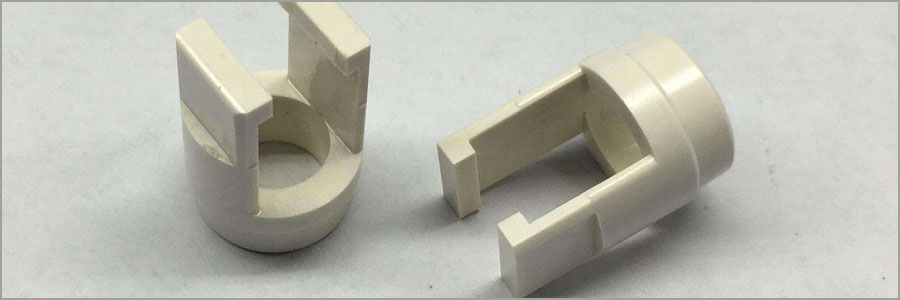Analyze the common processing technology of plastics
Machining technology of plastics
| Our common plastic processing processes generally include extrusion molding, injection molding, molding, blow molding, rotational molding, casting, and plastic molding. These molding processes are specifically selected according to different materials and products. |
-
 Blow molding: HDPE 1/3 or more models can be blow molded. . Blow molding grade characteristics such as melt strength, ES-CR and toughness are similar to those used for sheet and thermoforming applications, so similar grades can be used.
Blow molding: HDPE 1/3 or more models can be blow molded. . Blow molding grade characteristics such as melt strength, ES-CR and toughness are similar to those used for sheet and thermoforming applications, so similar grades can be used.
- Extrusion: Grades used for extrusion production typically have a melt index of less than 1 and a medium to wide MWD. A low MI gives a suitable melt strength during processing. The wider MWD grade is more suitable for extrusion because of their higher production speed, lower die pressure and reduced melt fracture tendency.
- Rotational molding: Materials using this processing method are generally pulverized into a powder to be melted and flowed in a thermal cycle. Rotational molding uses two types of PE: generic and crosslinkable. General purpose MDPE/HDPE typically has a density ranging from 0.935 to 0.945 g/cc and has a narrow MWD for high impact and warpage, with a melt index typically ranging from 3-8. Higher MI grades are generally not applicable because they do not have the desired impact and environmental stress crack resistance of the rotomoulded article.
- Injection: Injections are commonly used to make smaller containers for packaging medicines, shampoos, and cosmetics. One advantage of this process is the automatic cornering of the bottles, without the need for post-finishing steps like normal blow molding. Although some narrow MWD grades are used to improve surface finish, medium to wide MWD grades are typically used.
- Blown film: PE film processing is generally performed by ordinary blown film processing or flat extrusion processing. Most PEs are used for film, general low density PE or linear low density PE. HDPE film grades are generally used wherever superior stretchability and barrier properties are required.
- Casting: Casting is mostly used to make plates, electrical insulation equipment, gears, pulleys, decorations and other products. It is called casting plastic II. The liquid resin can be injected into the cavity or introduced into the cavity by other methods to form a solid product of the shaped solid product without adding a slight pressure or a slight pressure to form a plastic product, which has the characteristics of fluidity and small shrinkage.
- Molding: The process of molding a plastic material under pressure, usually simultaneously, by means of a mold or a die, where the "mold" is used to modify the "plastic".
-
Dip plastic: Dip plastic is generally used for signage, it is a
process with relatively low efficiency, and the temperature is not well
mastered.
The above is the machining technology of conventional plastic products. In fact, with the changes in the needs of different industries, there are many processes for cnc plastic processing, but there are some requirements for the material of plastics, generally higher hardness and higher density. Large materials, such as Teflon, pom, peek, etc., the tools used in plastic processing mainly include high-speed steel milling cutters, carbide milling cutters, machining plane milling cutters, milling cutters, special shapes. Face milling cutters, pitch milling cutters, shovel milling cutters and turning tools.
PTJ Manufacturing Shop is a professional manufacturer of high-precision cnc processing. Of course, the processing products also include cnc plastic processing. The company has more than 50 sets of cnc CNC machining equipment, which can process a variety of plastics. For e-cigarettes, medical equipment, drones, optical parts, etc., please call us, visit us, and discuss cooperation.
|
PTJ Machining Capabilities |
|
Automatic Bar Machining – Multi-spindle cam automatic screw machines CNC Turning – CNC delivers peak cost efficiency in shorter volumes, as well as high capacity production of mechanically simple components Custom Machining - with up to 12 axes of control Multi Spindle Machining- ISO 9001:2015 certified Screw Machine Products – The number of customized production parts per hour can reach 10000pcs Swiss Machining – with up to 9 axes of CNC control, to produce precision components with complex geometries in one operation High Volume Machining – 100 Advanced Production Turning Bar Automatics On-line and Ready CNC Milling - Machining Fully compliant with the exacting requirements of our customers 5 axis (11 axis) Machining – Tolerance | 0.1mm alignment |
What Can we help you do next?
∇ Get more information about Cnc Machining Shop
→Case study-Find out what we have done.
→Ralated tips about cnc machining services
By PTJ Manufacturing Shop|Categories: Blog|Tags: cnc milling services, cnc turning services, milling parts, turning parts, machining parts, special parts,faqs,technical news,company news,material news |Comments Off
